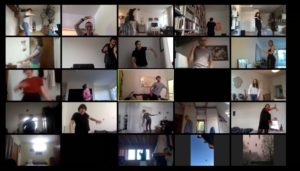Zoom me out – and take me back to “normal”
“Imagine if you go to a lecture, and in the same classroom where you talk with your professors, you also meet with your parents, talk gossip with your friends, go to the toilet, or date someone. Isn’t that weird?”
This is our current state of reality. Aspects of our lives that used to be separated, now happen in the same space – but what are the implications on us as students when our normal context collapses?
--
Zooming into the third day of the Haniel Summer Academy, and the third day of intensive video conferencing, it was time to put our feelings into words: both for the sake of answering the research questions related to our group project, but also to ensure the well-being and alignment of expectations in and between the group members.
As reflected upon in the previous blog entries, the controlling measures of Zoom are starting to get under our skin as time spent on the platform goes by – it’s almost like the device has infiltrated our lives, without our consent and to some extent without our awareness.
On the one side, Zoom has the effect of draining its users of energy, as non-verbal cues are hidden, forcing users to pay more attention to perceive a message. Often leaving us detached and disembodied. On the other side, it also gives absolute control to the administrator of the conference. Reducing autonomy and leaving us feeling powerless (or empowered) at times.
Detachment and disembodiment – these are keywords that can describe our group’s mood in the present. We are detached from the normal behavior of life in general, and for the Haniel Summer School in particular; we crave the regular connection we would have had with other groups, had we only been in Berlin.
Zoom as an artifact also does control us as students by giving “power” to the host of the conference, together with the algorithms that govern the displaying of our personal input to others. In which way? The top of mind example discussed in our group was one team member’s behavior during today’s lecture.
With a terrible headache, he decided to turn off his camera during the morning session. He did so consciously by knowing he would break the Summer Academy’s rules of participation, taking the risk, hoping that few people would notice as the algorithm would position him, as with all other “empty faces”, at the “bottom” of the grid of participants in the call.
Professors can’t force you to turn on your camera – they will try to persuade you to keep your camera on at all times, but in the end it’s your decision whether to stand by the rules or to resist the technology’s control of your personal space and state.
Thinking about the matter of resistance to the technology, some of us acknowledged the fact that there is no way to evade the control of Zoom – there is no alternative available to attend the Haniel Summer Academy this year, for example. As it's a mandatory course for some of us, being stuck in Zoom calls unwillingly is something that cannot be avoided, just as it can't be avoided in present times to have a Facebook profile or an e-mail account. It's impossible to avoid embracing these technologies if you don't want to miss out on pivotal opportunities and/or necessities in the COVID-19 life.
Embarking on this journey of discovering the controlling and often intimidating effects of digital and virtual technology on us as individuals, groups, and parts of society, is indeed enlightening. Because even when Zoom drains us of energy, or when the feeling of detachment or loss of control comes sneaking, we may remind ourselves that the current, “digitally concentrated” state of reality is only temporary. Experiencing this unique time of absolute digital dependence gives us as students, and you as professors, the opportunity to put aspects of our lives in perspective, experience the potential forceful nature of digital technologies and appreciate the beauty of our normal everyday lives.
Thinking ahead, we today started to brainstorm how we may present our findings and reflections of the abnormalities arising from the corona situation in general and the use of Zoom in particular. The process ahead involves embarking on a journey to further understand what normal is. Our first hypotheses: In the time after COVID-19 we might need to rethink what “normal” and “abnormal” social behavior really is – maybe it will even be considered normal to dance salsa with your professors, who knows? 😉

Picture: Haniel Summer School dancing salsa on Zoom
Xoxo,
Alma, Bea, Davide, Karolina & Oskar